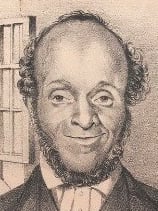

William Cuffay - Union Leader
William Cuffay was a tailor, an activist, and a formidable leader of the working-class Chartist movement at a time when Mixed Race and Black voices were barely acknowledged or heard in British public life. He was born in Chatham, Kent in 1788 his mother was English and his father was a formerly enslaved African man from St. Kitts who had served in the Royal Navy. It’s speculated that the name Cuffay comes from the Ghanaian name Kofi. William moved to London and became an apprentice tailor before working as a journeyman tailor. Wages were low, hours long and workers had no rights whatsoever. In an attempt to improve conditions Cuffay and his fellow tailors went on strike - in response his employers sacked the strikers. Cuffay was furious.
By the 1830s the Chartist movement had been gathering momentum, Chartists campaigned for votes for all males, secret ballots when voting and parliamentary reform. Cuffay joined the movement and became a popular leader. He rose quickly through the ranks and was elected to the National Executive of the National Charter Organisation, and then in 1842 President of the London Chartists. By 1848 Cuffay had become one of the movements executive leaders.
But his radical spirit came at a price. In 1848, during the government crackdown on reformers following the failed Chartist petition, Cuffay was arrested and put on trial for “conspiring to levy war” against the Queen. He protested stating –
I demand a fair trial by a jury of my peers and equals
…...rather than the middle-class jury Cuffay knew he would face. The authorities clearly viewed him as a major threat. He was described in newspapers as – the black man and his party
The middle class were shook - so much so that Cuffay was wrongly convicted and removed from the UK. He knew he didn’t stand a chance at trial and would be convicted regardless of any evidence presented as the police lied and proceeding were rigged. Cuffay’s absence would clearly destabilise the Chartist movement.
Cuffay was convicted, sentenced and transported to Tasmania, Australia (then known as Van Diemen’s Land). He was pardoned three years later but chose to stay in Tasmania. Cuffay remained active and continued campaigning for workers’ rights and equality until his death in 1870. Although poor Cuffay remained politically engaged.
William Cuffay was disabled – he was born with a deformity of the spine and stood at 4ft 11 inches. What’s remarkable is despite being working class, Mixed-Race Black and disabled he was so impactful and inspired thousands of people who followed his lead. Cuffay’s tenacity and courage was remarkable.
"I am not anxious for martyrdom but I feel that after what I have gone through this week I have the fortitude to endure any punishment your Lordship can inflict upon me. I know my cause is good and I have a self-approving conscience that will bear me up against anything and that would bear me up even to the scaffold – therefore I think I can endure any punishment proudly. I feel no disgrace at being called a felon"
William Cuffay 1848 at his trial (before sentencing)
Want information about community jobs? Click HERE
